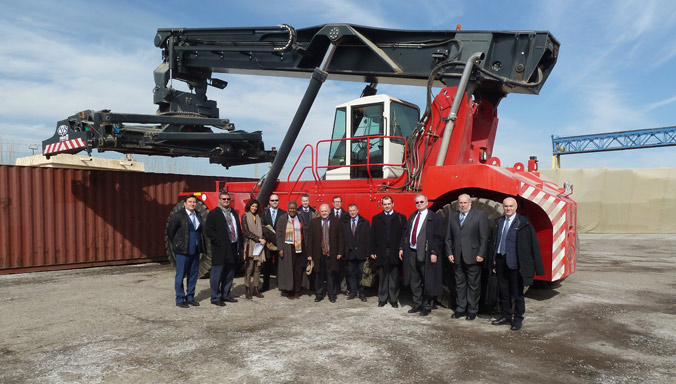Relations with Uzbekistan
Uzbekistan cooperates with NATO in a broad range of areas, including civil preparedness, the development of armed forces and countering current security threats. NATO supports the democratic and institutional reform processes in Uzbekistan, specifically in the area of defence and security sector reform.

NATO Liaison Officer for Central Asia during a visit to the freight terminal in Termez in 2016
- Relations with Uzbekistan started in 1992, when the country joined the North Atlantic Cooperation Council. This forum for dialogue was succeeded in 1997 by the Euro-Atlantic Partnership Council (EAPC), which brings together all Allies and partner countries in the Euro-Atlantic area.
- Practical cooperation began when Uzbekistan joined the Partnership for Peace (PfP) in 1994.
- Objectives for cooperation are set out in an Individual Partnership and Cooperation Plan (IPCP), which is agreed for a two-year period.
- The NATO Secretary General’s Special Representative for the Caucasus and Central Asia has been conducting high-level political dialogue with Uzbek authorities.
Uzbekistan’s cooperation with NATO is mutually beneficial and includes:
Building capabilities and interoperability
- Uzbekistan participates in NATO’s Defence Education Enhancement Programme (DEEP), which provides expertise on how to build, develop and reform educational institutions in the security, defence and military domains. Uzbek officers have participated in numerous military education activities, including seminars and workshops on defence policy and strategy within the PfP framework, counter-terrorism training, and English language training.
- Uzbekistan has participated in the PfP Planning and Review Process (PARP) mechanism.
Support for NATO-led operations and missions
- Uzbekistan offered support to the International Security Assistance Force (ISAF) troops in Afghanistan with transit agreements. Also, Uzbekistan hosted the Office of the NATO Liaison Officer for Central Asia in Tashkent from 2013 until 2017, when the Office was closed for budgetary reasons.
Wider cooperation
- Uzbekistan developed its civil response capacity for natural and man-made emergency situations in consultation with the Allies. In April 2003, Uzbekistan hosted the first Euro-Atlantic Disaster Response Coordination Centre (EADRCC) exercise held in Central Asia, which simulated an international response to a major earthquake in the region, and also participated in another consequence management field exercise held in Romania the same year. Uzbekistan offered assistance through the EADRCC to several nations struck by natural disasters.
- Uzbekistan has been actively engaged within the framework of the NATO Science for Peace and Security (SPS) Programme since 1993. Leading areas for cooperation include energy security, environmental security, and disaster forecast and prevention.
